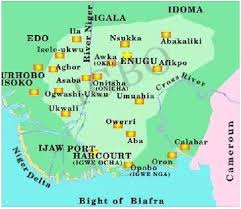A Historical and Geopolitical Overview of the Bight of Biafra.
A large bay on Africa’s western coast is called the Bight of Biafra, sometimes referred to as the Bight of Bonny. It is a sizable portion of the Gulf of Guinea, extending from Gabon’s Cape Lopez to Nigeria’s Niger Delta. This body of water has been extremely important to the West African region’s history, economy, and geopolitics. Natural resources abound in the Bight of Biafra, especially oil and gas, and the area has a rich and complicated past that will always be remembered.
Geography and Natural Resources
Nigeria, Cameroon, Equatorial Guinea, and Gabon form the geographical borders of the Bight of Biafra. The Niger River, one of Africa’s major rivers, flows into the Bight, forming a lush delta that supports a variety of ecosystems. The coastal areas around the Bight are distinguished by mangrove forests, marshes, and estuaries, which are home to a diverse range of wildlife.
One of the most remarkable aspects of the Bight of Biafra is its huge oil and gas deposits. The discovery of oil in the Niger Delta region has propelled Nigeria to the top of Africa’s oil production list. This has provided economic benefits to the region while also posing serious environmental and social issues. Oil spills, gas flaring, and pollution have had a terrible impact on the local environment and communities, causing tensions and conflicts.
Historical Significance: Transatlantic Slave Trade
The Bight of Biafra has a dismal past as a significant hub for the transatlantic slave trade. Between the 16th and 19th centuries, European slave dealers established trading ports along the coast, capturing and exporting millions of Africans to the Americas. The Bight of Biafra was one of the principal locations where enslaved Africans were captured, particularly from the Igbo, Ibibio, and other ethnic groups in what is now southeastern Nigeria.
Slave ships crossed the Atlantic with their human cargo, sailing out of ports such as Bonny, Calabar, and Old Bimbia. The region was significantly impacted by this time period in terms of both culture and population. The loss of so many individuals upended local economies, governments, and society. The African diaspora and the coastal towns around the Bight of Biafra, where memories of this terrible period in history linger, are two places where the slave trade’s legacy is still felt today.
Nigerian Civil War and the Bight of Biafra
The word “Biafra” rose to international prominence during the Nigerian Civil War (1967–1970), also known as the Biafran War. The conflict began when Nigeria’s southeastern area, mainly by the Igbo ethnic group, declared independence and established the Republic of Biafra. Independence was fueled by ethnic conflicts, economic inequality, and political marginalization.
During the conflict, the Bight of Biafra became strategically vital because it allowed Biafra to receive humanitarian relief and military supplies by water. However, the Nigerian government’s blockade caused significant starvation and misery in Biafra, contributing to the final downfall of
the breakaway state. The battle claimed the lives of one to three million people, the majority of whom perished from famine.
The Biafran War’s legacy is still felt in Nigerian politics and society today. The region continues to be economically and politically isolated, with some calling for more autonomy or even outright secession.
Contemporary issues and geopolitics
Today, the Bight of Biafra remains an important location for West Africa’s economy, mainly due to its oil and gas sector. Nigeria, Cameroon, Equatorial Guinea, and Gabon all rely substantially on the extraction of these minerals. However, this dependency has resulted in a number of issues, including environmental deterioration, economic inequality, and political instability.
Piracy in the Gulf of Guinea, which includes the Bight of Biafra, has been a major security problem in recent years. Armed groups, typically motivated by political and economic grievances, have targeted oil tankers and cargo ships, prompting international attempts to strengthen maritime security in the region.
Furthermore, local populations, particularly in the Niger Delta, have protested and opposed oil production due to its environmental impact. Pollution, soil degradation, and the destruction of livelihoods have resulted in conflicts between oil firms, governments, and local communities.
The Bight of Biafra has a rich and complicated history, characterized by both tragedy and resilience. From its role in the transatlantic slave trade to its importance in the Nigerian Civil War and its current status as a significant oil-producing region, the Bight of Biafra remains a focal point of West African history and geopolitics. The challenges it faces today—environmental deterioration, economic inequality, and security threats—are bigger issues in the area, but they also demonstrate the continued importance of the Bight of Biafra in shaping the future of West Africa.


The civil war was already on the Igbos before the declaration of Biafra independence. Please dont make it sound as if Igbos did not want to be part of Nigeria abinitio. The Nigerian government did nothing to stop the killing of Thousands of Igbos in the North, and South west. Igbos were indirectly forced to protect themselves by declaring independence from the Igbo killing govt. Biafra independence was forced on us as a result of the igbo killings and nonchalant attitude of Gowon lead govt to protect Igbo lifes and properties all over the country.
Please don’t join others in painting us with a tarterd brush… Biafra independence was born because it was important for us to protect ourselves from been killed in Nigeria unchallenged.
Brother the article was not about Biafra and the Civil war but the location called Bight of Biafra. I do not think I painted my region or the war my people fought in a negative light. Please point out areas you are not comfortable in the article.
Thank you for the feedback. I appreciate.